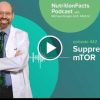Healthy Living
Can Eye Drops Really Reverse Cataracts?
Date: 2025-05-15 21:16:55
Have you seen NAC eye drops (N-acetylcarnosine) promoted online as a natural way to prevent — or even reverse — cataracts? If you’ve been searching for a natural way to reverse cataracts without surgery, NAC eye drops for cataracts—also known as N-acetylcarnosine eye drops—have gained attention as a potential alternative remedy. Promoted by many as a natural remedy and the best remedy for cataracts, these eye drops aim to reduce oxidative stress in the lens, which is believed to contribute to cataract formation. Many popular health gurus online have discussed cataract eye drops as a promising approach in how to prevent cataracts and possibly reverse cataracts naturally. While some NAC eye drops reviews highlight improved clarity and comfort, it’s important to remember that the evidence remains limited and mixed. Doctor Eye Health and other experts often stress the need for more research before calling NAC eye drops a true cataract treatment. Still, for those looking into how to cure cataracts or delay progression, N-acetylcysteine eye drops and carnosine eye drops remain intriguing options within the broader discussion of cataract remedies and natural eye health support. Always consult an eye care professional before trying any new cataract remedy.
#cataracts #naturaltreatments #naturalremedy
DISCLAIMER: All content in this video and description including information, opinions, content, references, and links is for informational purposes only. The Author does not provide any medical advice on the Site. Accessing, viewing, reading, or otherwise using this content does NOT create a physician-patient relationship between you and its author. Providing personal or medical information to the Principal author does not create a physician-patient relationship between you and the Principal author or authors. Nothing contained in this video or its description is intended to establish a physician-patient relationship, to replace the services of a trained physician or health care professional, or otherwise to be a substitute for professional medical advice, diagnosis, or treatment. You should consult a licensed physician or appropriately-credentialed health care worker in your community in all matters relating to your health.






